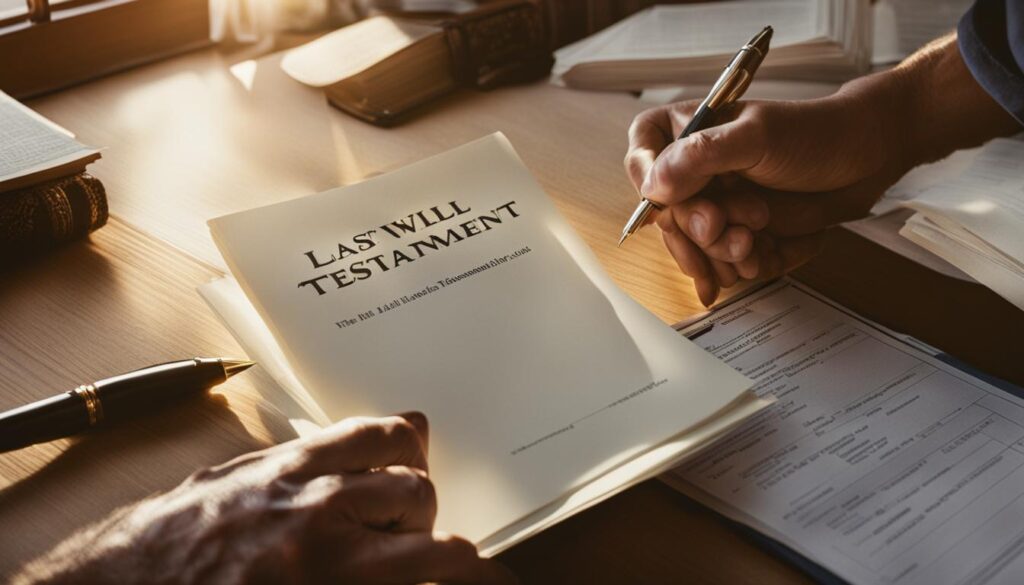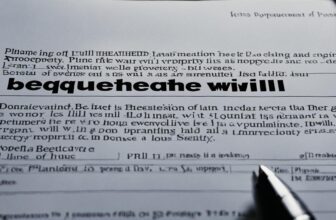
Creating a personalized estate plan is a vital process for individuals of all backgrounds, allowing you to secure your legacy and effectively manage your personal and financial affairs both in life and after passing. Estate planning is more than just writing a will; the addition of an advance health care directive and power of attorney ensures that you are prepared for any unexpected circumstances while still alive. By considering the welfare of your children, the distribution of assets, and the handling of personal belongings, you can guarantee that your final wishes are met and your legacy is preserved.
Understanding Estate Planning Basics
Estate planning is an essential process that allows individuals to make crucial decisions regarding their assets, healthcare, and financial responsibilities while they are alive and after their passing. Contrary to popular belief, estate planning is not exclusive to the wealthy and encompasses several essential documents that protect personal interests, healthcare preferences, and help avoid probate court proceedings. Let’s delve deeper into the components of estate planning.
Why Estate Planning is Not Just for the Wealthy
Although often associated with the affluent, estate planning is a crucial process for individuals from all walks of life. Preparing a legal will ensures your assets and personal belongings are distributed according to your wishes after your death. It also plays an essential role in safeguarding your family’s future and welfare, including the care of minor children and the management of your financial affairs.
Essential Documents: Advance Directives and Powers of Attorney
An estate plan typically includes various essential documents such as an advance health care directive and a power of attorney. An advance health care directive allows you to express your healthcare preferences in case you become unable to make decisions on your own, ensuring that your wishes are respected. A power of attorney, on the other hand, designates a trusted individual to handle your financial matters and make decisions on your behalf if you are incapacitated.
The Role of Living Trusts in Avoiding Probate
A living trust is an estate planning instrument that facilitates the transfer of assets to your beneficiaries, enabling probate avoidance. Probate is the legal process through which assets are distributed after someone’s death and can be time-consuming and expensive. By creating a living trust, you can expedite the transfer of assets, such as your home, to your loved ones, bypassing the probate process and preventing unnecessary delays and expenses that might burden your family.
Assessing Different Types of Wills

Selecting a will tailored to your unique circumstances is crucial to ensure your estate is managed according to your wishes. To make an informed decision, it is essential to know the different types of wills available and the specific advantages they offer.
A simple will is ideal for those with relatively uncomplicated assets and family situations. This type of will outlines basic instructions for distributing assets and guardianship of minor children.
If you have concerns about the well-being of a minor or someone who requires special care, a testamentary trust is worth considering. This trust is created within the will and offers added financial protection and management for the specified beneficiaries, ensuring their needs are met.
Couples who wish to streamline their estate planning can benefit from a joint will. This legal document binds both partners and ensures mutual distribution of assets upon death, simplifying the process for each spouse. However, keep in mind that a joint will may limit the surviving partner’s flexibility in making any changes after the first partner’s passing.
For those who want to preserve their healthcare autonomy, a living will is the perfect solution. This document clearly states your preferred medical treatment choices in the event of incapacitation, effectively eliminating any ambiguity regarding your medical care.
Assessing the various types of wills and making an informed choice is a vital step in the estate planning process. By understanding the advantages of each type, you can select the most appropriate will for your situation, ensuring your assets are managed according to your desires, and providing peace of mind for both yourself and your loved ones.
Securing Your Legacy: The Importance of a Legal Will

Constructing a last will and testament is a fundamental step in preserving one’s legacy, ensuring a smooth transition of assets and care for loved ones after death. A legal will serves as a formal statement of intentions, detailing the designated beneficiaries, selection of an executor, and outlining instructions on the division of assets. This legally binding document enables you to have complete control over how your personal assets are distributed and offers peace of mind that your desires are respected.
Creating a legal will helps protect your beneficiaries from potential disputes and complications that may arise in the absence of comprehensive instructions. It assures that your estate is managed and distributed according to your wishes, mitigating any confusion or disagreements among surviving family members. By having a legal will in place, you can focus on living your life, knowing your legacy is secure.
A valid will also expedites the probate process, mitigating the administrative burden on your survivors and paving the way for asset distribution more efficiently. Without a legal will, the court takes over the distribution of assets based on state intestacy laws, which may not accurately reflect your desires. This process may also result in unnecessary delays and additional costs, causing stress and financial strain on your loved ones.
Despite common misconceptions, preparing a will is not reserved for the wealthy. Regardless of your net worth or the complexity of your estate, a well-prepared legal will is essential to maintain an orderly and hassle-free transfer of assets. By investing time and effort into creating a legal will, you not only preserve your legacy but also ensure your family’s security and well-being.
Step-by-Step Guide to Making Your Will

Creating a will can be an intricate process that requires prudent preparation and attention to detail. This step-by-step guide will help you navigate through asset identification, designating beneficiaries, and choosing an executor of your will, ensuring that your estate is managed according to your wishes.
Gathering Necessary Documents for Asset Identification
Before drafting a DIY will or using an online will platform, you must first gather essential documents that will enable you to pinpoint your assets and obligations accurately. Collect items such as bank statements, property deeds, insurance policies, investment portfolios, retirement accounts, and any outstanding debts. A thorough asset identification process provides a comprehensive view of your estate and serves as the foundation for crafting your will effectively.
Crucial Steps in Designating Beneficiaries
One of the most important aspects of making your will is selecting the appropriate beneficiaries for your assets. Take ample time to consider the individuals you wish to bequeath your estate, keeping in mind the potential for familial disputes and the alignment of personal sentiments. Evaluate each potential beneficiary’s needs and circumstances to ensure fair and equitable distribution. In cases involving minor children, designate guardians who will responsibly care for them in the event of your passing.
Selecting and Informing Your Will’s Executor
The executor of your will holds the crucial responsibility of managing your estate and ensuring the proper execution of your final wishes. Select a person who is trustworthy, responsible, and fully prepared to handle the complexities of managing your estate. After selecting your executor, make sure to inform them of their role, discuss their responsibilities, and provide them access to pertinent documents relevant to your will. This preparation will guide the executor through the process and cultivate a clear understanding of your final wishes and intentions.
In conclusion, a well-crafted will is essential for safeguarding your legacy and protecting the interests of your loved ones. By following this step-by-step guide, you can ensure a thorough and thoughtful approach to asset identification, designating beneficiaries, and appointing a capable executor of your will.

Understanding the legal landscape, including state laws and probate procedures, is paramount in estate planning. Each state has differing statutes governing wills and trusts, which necessitates being well-versed in the jurisdiction where you reside or own property. This knowledge informs the creation of a will or a living trust to circumvent lengthy probate processes in states like California, where probate can be an arduous and time-consuming endeavor.
Probate procedures vary across states as well, with some having streamlined processes for smaller estates, while others mandate more formal procedures. When making your will, it’s essential to consider the governing estate planning laws in your region to ensure your testament adheres to legal requirements and affords a smoother probate process for your successors.
Employing the assistance of a knowledgeable estate attorney with specialization in your locality’s rules can be invaluable in navigating the complexities of state laws and probate procedures. This expertise can help in crafting a legally sound will, reducing the likelihood of disputes among beneficiaries, and mitigating potential challenges to the will in court.
In conclusion, a thorough understanding of state laws and probate procedures is fundamental in the estate planning process. Such comprehension allows individuals to create legally binding documents that stand up to scrutiny, ultimately securing their legacy and providing peace of mind for themselves and their loved ones.
Estate Planning for Parents: Assigning Guardianship for Minors

For parents, an essential aspect of estate planning involves appointing a suitable guardian for their minor children in their will. This guardian selection process must be navigated with utmost care, taking into account the children’s needs and shared values. In addition, it is prudent to consider backup guardians to ensure their children’s well-being if the primary guardian cannot fulfill their role.
Selecting a guardian for your children requires more than just a fleeting thought. You must ensure that their values and approach to life align with yours, as well as consider their capacity to provide a loving and supportive environment. It is essential to discuss your expectations with the potential guardian and gauge their willingness and ability to take on this crucial responsibility.
Understanding the Guardian’s Responsibilities
A appointed guardian must be aware of the responsibilities that guardianship entails, such as financial stability, childcare, educational choices, and healthcare decisions. The guardian should also have a clear understanding of your desires and be prepared to act accordingly. In your estate planning process, openly discuss these expectations and tasks with your chosen guardian to maintain transparency and avoid unforeseen challenges in the future.
Creating Backups: The Necessity of Secondary Guardians
Life is unpredictable, and circumstances can change without notice. To account for this, it is crucial to designate alternative or backup guardians in your estate plan. These backups serve as a safety net should your primary guardian selection become unable or unwilling to fulfill their guardianship responsibilities for your minor children.
Preparing for Incapacity: Advanced Healthcare Directives
Advanced healthcare directives are a crucial component of estate planning, as they enable individuals to outline their healthcare preferences in case they are unable to make autonomous decisions. By preparing for incapacity with advanced healthcare directives, individuals can mitigate the emotional burden on family members and assure that their medical wishes are respected.
To implement an advanced healthcare directive, a person should clearly state their medical preferences and document them with the help of an experienced attorney. This attorney will ensure the directive adheres to state-specific laws and regulations. Furthermore, notifying family members and healthcare providers about the existence and location of the directive is an important step in guaranteeing its effectiveness.
Preparing an advanced healthcare directive requires consideration of various medical scenarios, such as life-prolonging treatment preferences and organ donation wishes. Moreover, appointing a trusted healthcare agent can help safeguard personal interests if decision-making capacity is lost. This agent will be responsible for directing medical professionals according to the pre-established preferences, hence, building a strong relationship and having open communication with them is essential.
In conclusion, advanced healthcare directives are indispensable tools in estate planning, allowing individuals to assert control over their future medical decisions even when faced with incapacity. By incorporating these instruments in their estate plan, a person can solidify their medical desires, minimize family conflict, and promote healthcare autonomy during difficult times.
Special Considerations: Trusts and Special Needs Beneficiaries

Estate planning often requires addressing special considerations that revolve around certain beneficiaries and unique assets. One of the vital steps involves implementing appropriate trusts, which can ensure that specific needs of beneficiaries are met without jeopardizing their eligibility for government benefits. For example, a special needs trust is a valuable instrument for individuals with disabilities who concurrently receive federal assistance. This trust allows them to inherit assets without jeopardizing their benefits, providing financial assistance and peace of mind for loved ones.
Another important aspect of estate planning is catering to unique assets like properties held in joint tenancy or business interests. Customized strategies facilitate smooth transitions and avoid probate-related challenges that can present serious pitfalls to the asset transfer process. Utilizing well-thought-out methods in the estate planning process minimizes potential issues and maximizes the benefits of these specialized assets.
In conclusion, accommodating special considerations in estate planning is essential to cater to special needs beneficiaries and unique assets effectively. By utilizing specific trusts and tailoring strategies to each situation, individuals can protect their legacy and ensure that their loved ones are well-taken care of, even after their passing.
Maximizing Tax Efficiency in Estate Planning

Tax efficiency plays a vital role in the estate planning process. By comprehending tax implications, specifically for assets such as IRAs and retirement plans, you can minimize the tax burden on beneficiaries and prevent them from inheriting tax liabilities. Knowledge of tax laws is essential for effectively executing your financial planning for wills.
Efficient estate tax planning ensures the preservation of asset value during the transfer process and alleviates the tax impact on heirs. This can further maximize the potential benefits for beneficiaries and facilitate seamless asset distribution.
To achieve tax efficiency in your estate plan, consider working with experienced financial advisors, estate planning attorneys, and tax professionals. These experts can identify potential tax-saving opportunities and help you develop a well-rounded strategy that incorporates tax efficiency measures, such as setting up trust funds, leveraging lifetime gift exemptions, or designating appropriate beneficiaries for tax-advantaged accounts.
Implementing tax-efficient strategies in your will is an essential part of ensuring that your beneficiaries receive the maximum benefit from your estate. Proper estate tax planning can significantly contribute to the successful execution of your legacy and provide much-needed financial stability for your loved ones.
Creating a Personal Inventory: Your Guide to Identifying Assets
Constructing a personal inventory is a crucial step in crafting a will. A comprehensive catalogue of tangible and intangible assets provides a thorough understanding of the estate’s extent and the importance of each asset, which in turn informs beneficiary designation and clearer estate directives. To create a complete personal inventory, one must first list all tangible and intangible assets and evaluate their significance.
Listing Tangible and Intangible Assets
Tangible assets include physical possessions, such as real estate, vehicles, personal items, and valuables. They also encompass financial investments, like stocks, bonds, and retirement accounts. It is essential to compile detailed information about each tangible asset, including its current market value, location, and documentation (deeds, titles, account numbers).
Intangible assets, on the other hand, are non-physical resources, such as intellectual property (patents, trademarks, copyrights), digital assets (online accounts, social media profiles), and goodwill or reputation. Identifying these intangible assets can be slightly more challenging, but it is imperative to include them in your personal inventory, as they may hold significant value, both now and in the future.
Evaluating the Significance of Each Asset
Once all tangible and intangible assets have been listed, the next step is to evaluate their significance. This assessment helps determine how assets should be distributed among beneficiaries and highlights any unique considerations that may need to be addressed, such as specific tax implications or unique maintenance requirements.
An asset’s significance may be derived from its financial value, sentimental worth, or implications on future growth and capital appreciation. Determining the significance of each asset can be subjective, based on an individual’s values and priorities. However, a comprehensive evaluation is crucial to create a well-rounded personal inventory that will ultimately guide a better-informed estate plan.
In conclusion, creating a personal inventory consisting of tangible and intangible assets is a vital element in the estate planning process. By identifying and evaluating all assets, individuals can ensure a thoughtful, well-crafted will that aligns with their wishes and provides a clear roadmap for beneficiaries and the executor of the estate.
Conclusion
In the realm of estate planning, finalizing your will is an instrumental step that signifies the responsible care one puts into securing their legacy. By taking the necessary steps and investing time into thorough estate planning, your last wishes will be respected and preserved, safeguarding your assets, property, and most importantly, your loved ones.
A well-crafted will stands as a testament to the effort and thought invested into estate planning, reflecting an individual’s life and achievements. Such wills not only serve as a final gift to one’s beneficiaries but also allow them to feel a deep connection to the deceased, understanding the decisions and values that guided their life.
Completing an estate plan is therefore a deeply meaningful and personal process, requiring careful consideration and planning. By embracing the importance of estate planning, you can rest assured that your final wishes will be respected, your assets efficiently managed, and your legacy protected for generations to come.
FAQ
Why is estate planning important for everyone, not just the wealthy?
Estate planning ensures that personal assets and affairs are managed according to one’s desires, both during their life and after passing. It goes beyond asset distribution and encompasses decisions concerning advance health care directives, power of attorney, and the welfare of children. Everyone can benefit from having an organized and personalized estate plan in place, regardless of wealth status.
What are some essential documents needed for estate planning?
Important documents for estate planning include advance health care directives, powers of attorney, wills, and living trusts. These documents ensure that your personal and financial matters are handled according to your wishes during your life and after you pass away.
How do I know which type of will is right for me?
The appropriate type of will depends on your individual and familial circumstances. Some options include a simple will, suitable for those with straightforward assets; a testamentary trust, accommodating the needs of minors or those with special considerations; a joint will, for couples wishing to ensure mutual asset distribution; and a living will, outlining healthcare treatment preferences in case of incapacity.
What are the key steps in making my will?
Prepare your will by gathering essential documents (bank statements, property deeds, insurance policies, etc.) for asset identification, carefully selecting beneficiaries and guardians for minors, and choosing a trustworthy executor to manage the estate. Understanding state laws and probate procedures is also crucial in the estate planning process.
How do I maximize tax efficiency in estate planning?
To maximize tax efficiency, understand the tax implications and consequences of your assets, particularly retirement plans, IRAs, and other tax-deferred holdings. Efficient estate planning ensures assets are transferred in a manner that preserves their value and minimizes the tax impact on beneficiaries.
How do special considerations, like trusts or special needs beneficiaries, factor into estate planning?
Special considerations can be addressed through the establishment of specific trusts, like a special needs trust, which ensures beneficiaries with disabilities maintain eligibility for government benefits while receiving inheritances. Business interests and other unique assets require tailored strategies for smooth transfers and avoidance of probate issues.





